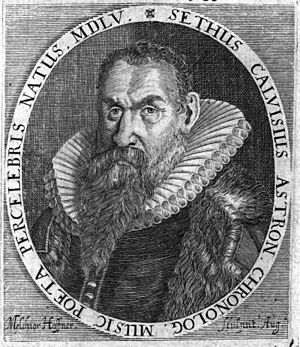Sethus Calvisius facts for kids
Sethus Calvisius (born Seth Kalwitz) was a very talented German person who lived a long time ago, from 1556 to 1615. He was good at many things! He was a music expert, a composer (someone who writes music), and a teacher. He also studied chronology (the science of arranging events in time) and astronomy (the study of stars and planets).
About Sethus Calvisius
Sethus was born in a small village called Gorsleben in Germany. His family were farmers, so they didn't have much money. But Sethus loved music and used his musical skills to earn enough money to start college. He began his studies at Helmstedt.
Later, a kind person helped him continue his education at Leipzig. In 1572, he became the director of a music school in a place called Pforta. This was a big achievement for him!
In 1594, Sethus moved to Leipzig to take on the same important job. He became the director of the famous Thomanerchor (a boys' choir) at the Thomaskirche (St. Thomas Church). He kept this job for the rest of his life, even though other universities wanted him to teach math for them.
Sethus Calvisius was also a smart astronomer. He wrote a book called Opus Chronologicum where he explained a system based on almost 300 eclipses. An eclipse is when the moon or a planet blocks the light from another space object.
He also had a clever idea to fix the calendar system. He wrote about this in his book Elenchus Calendarii Gregoriani. Plus, he published a book about how to write music, called Melodiae condendae ratio. He even wrote his own choral music, like the piece Unser Leben währet siebzig Jahr.
What Sethus Calvisius Created
Sethus Calvisius created many important works during his life. Most of his writings were about music, time, and calendars.
- He published collections of church songs and spiritual hymns. These were often set for four voices.
- He wrote books explaining how to compose melodies and practical music rules.
- He also worked on big projects about time, like his Opus chronologicum, which looked at how to organize history based on the movements of the sun and moon.
- He wrote about calendar reforms, trying to improve the way we measure years.
- Sethus also created books to help people learn Latin, like a Latin-German dictionary.
- He composed many musical pieces, including motets and other songs.
 | Georgia Louise Harris Brown |
 | Julian Abele |
 | Norma Merrick Sklarek |
 | William Sidney Pittman |


